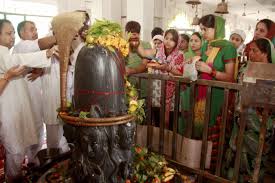Religious Occasions in Islam and Hinduism

Different types of offerings are offered to the Hindu deities, gods, and goddess on several occasions of the year.
Muslims have many days during the year that are celebrated all over the world, such as, Jumu`ah, `Eid Al-Adha, `Eid al-Fitr including the beginning of the new Hijrah year. Islamic culture is characterized by purity, nobility of purpose that is meant to enhance the ethical values and spread the spirit of philanthropy among Muslims. Perhaps, this feature distinguishes Islam from other religions during their celebrations.
Feeding the poor, giving charity to the orphans, helping the needy, visiting friends, caring for the sick, and performing the worship of Allah the Almighty are the most important aspects of celebration in Islam. As well as, Islam is keen to teach its followers to remove any harm from the people and not to expose them to any danger in any circumstance.
Hindu Calendar
Some Hindu calendars are as old as the Gregorian Calendar, in Hindu society various eras are used for numbering the years; the most common are the Vikrami Era, beginning with the coronation of the King Vikram-Aditya in 57 B.C.E. (Before Common Era) and the Shaka Era, counting from 78 C.E. (the Common Era) For these three systems, the year 2000 corresponds to 2057, 1922, and 5102 respectively, though the last figure is subject to some debate.(1) However, the first Hijri year coincides with 622 C.E.
In Hinduism, there are many festivals and celebrations that are celebrated by Hindus. However, most of the Hindu festivals are accompanied by idolatry and worship of nature.
Al-Bayruni(973-1048A.D.) sheds some light on special days in Hinduism and introduces some related religious practices and rituals. He says in this context:
“The single days enjoy different degrees of veneration according to certain qualities which they attribute to them. Hindus distinguish Sunday because it is the day of the sun and the beginning of the week, as Friday is distinguished in Islam. To the distinguished days, further belong Amavasya that means new moon night in Sanskrit, and Purnima, i.e. the days of conjunction (new moon) and opposition (full moon), because they are the limits of the decrease and the increase of the moonlight. In accordance with the belief of the Hindus regarding this increase and decrease, the Brahmans sacrifice continually to the fire in order to earn heavenly reward.”(2)
You can note clearly in the above-mentioned passage that worship is offered to the fire, while, the AryaSamaj claim that monotheism has been the doctrine of the Vedas and the belief of the ancient Hindus.
Moreover, Al-Bayruni adds:
“The third Magha, called Mahatritiya is a feast for the women, and sacred to Gauri. They meet in the houses of the most prominent among them before the image of Gauri, place before it various sorts of costly dresses, pleasant perfumes, and nice dishes. In each meeting-place they put 108 jugs full of water, and after the water has become cool, they take bath with it four times at the four quarters of that night. On the following day, they give alms, banquets and receive guests. The women’s washing with cold water is common to all the days of this month.”(2)
In addition to that, we find even in recent days some sorts of worship and rituals in Hindu society that contradict the simplest principles of logic and wisdom, as can been seen in Diwali, Holi and KumbhMela. These celebrations are accompanied with acts of polytheism, idolatry, free mixing between men and women and drinking wine that leads to the forbidden relationship between men and women.
These practices result in many other immoral and evil acts that take place during their festivals. During Hindu festivals a lot of money is squandered in useless rituals and harmful practices. You can see in KumbhMaila, the biggest gathering in the world a lot of unethical acts which is characterized by mixing of men and women when they dive into the river Ganga. The Hindu pilgrims are seen totally naked, specially, the priests who are called Naga Baba. The same would be said about the Holy festival that is accompanied by much of the evils; throwing colors on the people; males and females, known and unknown, Hindu and Non-Hindu in the streets and roads who come out from their homes going to their schools, jobs, offices or markets. In addition, thousands of rupees are wasted on fireworks and a large quantity of pure milk and Ghee are spelt on idols in the name pleasing the gods and goddesses. While millions of children die of starvation in their own country. You can see a video that shows how Ghee is offered to a Hindu deity in very large quantity.
Moreover, the experts of environment have confirmed the negative results of fireworks and crackers on the fresh environment, the Times of India says:
“An analysis of levels of various pollutants on Diwali day since 2010 reveals a disturbing trend. Levels of some pollutants, including sulphur dioxide (SO2) and nitrogen dioxide (NO2), seem to be on the rise.”(4)
The analysis adds:
“The levels of particulate matter (P.M.) 2.5 (particles smaller than 2.5 micrometers), which have serious health implications as these tend to get lodged in the lung and can even enter the bloodstream, have been seven to eight times higher than the standard level for several years.” (5)
On the contrary, when Islam orders to remind of some important days, or celebrate some festivals it gives clear instructions about what must be done and what must be avoided. In Islam, every act that benefits the individual and society must be done whether in festivals or in ordinary days, and every act that harms anyone must be avoided always; in festivals or common occasions. In fact, the celebration of Islamic festivals is a chance to evaluate one’s words and deeds. It is a time for accountability and self-criticism in order to reform the individual and society according to the teachings of the Glorious Qur’an and blessed Sunnah.
The Message of Islamic New Year to Hindu Brothers
When the Islamic New Year bears a message of self-assessment for Muslims, it bears a message for non-Muslims and Hindus also. It invites them to evaluate themselves. They are encouraged to examine if the belief they believe is a true and logical doctrine? What is the purpose of this life? Is this life based on intention and goal? Is this universe without a creator or there is a Creator? Are our actions, words and deeds according to the teachings of God? Is the phenomenon of death the end of person or is it one of the stages of life? Therefore, we seize the opportunity to invite our Hindu brothers and sisters to examine the message of Islam from its original sources represented in the Glorious Qur’an and Sunnah.
________________________
(1) http://hinduism.iskcon.org/practice/402.htm(Last accessed on 4/11/2014)
(2) Al-Bayruni’s India, translated by Dr. Edward C. Sachau, Londonkegan Paul, Trench, Trubner& CO. Ltd. Dkyden House, Gerrakd Street, W.1910,2nd p.185. )
(3) Ibid.
(4) http://timesofindia.indiatimes.com/city/delhi/Air-pollution-on-Diwali-getting-worse/articleshow/44864005.cms. (Last accessed on 28/10/2014)
(5) Ibid.
[opic_orginalurl]

